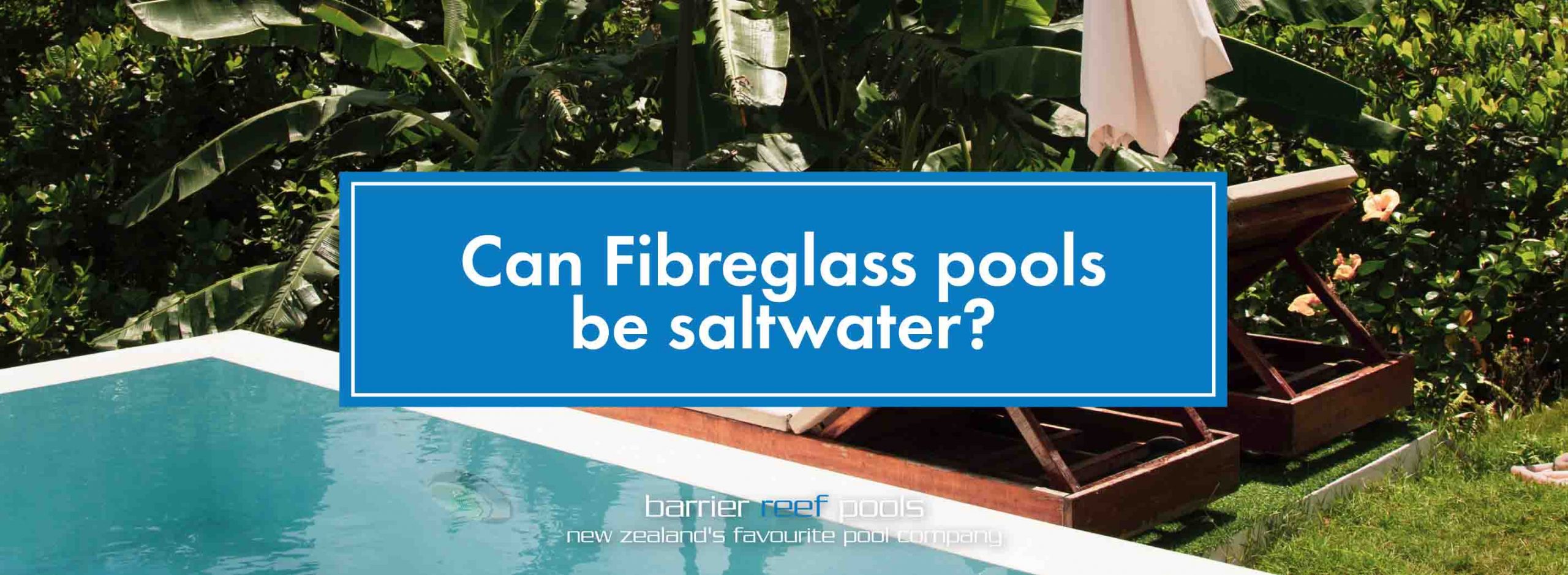Can Fibreglass pools be saltwater?
Saltwater is becoming a very popular choice amongst pool owners, and a question which is often asked is “Can fibreglass pools be saltwater?”
Fibreglass pools are highly compatible with saltwater and is just another consideration you need to take into account when planning your new swimming pool. Alongside the shape and design, you need to consider which sanitising agent that you will choose to sanitise your pool. The traditional method of chlorinated pools will typically require more maintenance and is actually more expensive to buy than salt, although the initial costs of installing a saltwater chlorinator is more expensive than a chlorine system. When buying a new pool, more and more people are opting for salt water, and even people who are already pool owners are converting their chlorine system into a saltwater one. One of the main reasons for this is they are more economical and are not as harsh on the body.
Wonder whether you should by a fibreglass pool or a concrete pool? Get the answers here!

What is the Difference Between Saltwater and Chlorine?
Essentially both systems will sanitise your water using chlorine. However the salt chlorine generator converts the salt into chlorine using a process called electrolysis to remove the algae and bacteria and keep your pool clean. Salt is added at a high level to the water using a salt chlorine generator. The generator will directly convert it into chlorine to sanitise the pool. So you won’t have to worry about actually tasting a lot of salt. Swimming pools have salinity levels that are 1/10th the salinity level of the ocean. A chlorine system cleans your pool with concentrated doses of chlorine, whereas a saltwater system still maintains the quality of the water to the same standard that traditional chlorine systems do, it just uses less chlorine.
Benefits of Salt Water:
Safe:
The chlorine levels are much lower than the concentration of chlorine, this eliminates exposure and contact to harsh chemicals. Unlike chlorine, with salt you can keep your eyes open underwater without having to worry about damage or have any pain.
No Chlorine Smell:
You will not have to be worried about leaving the pool smelling like chlorine. Salt water pools have very low concentrations of chlorine which aren’t harsh on the body.
More Economical:
Saltwater pools are more economical to run than chlorine. Salt is cheaper than traditional chlorine. Chlorine is around $150 a year whereas salt is around $20.
Clean:
The process of electrolysis in the saltwater system releases hypochlorous acid to help maintain a clean pool.
Good for Skin:
Saltwater is also known to feel softer and increases the ability of the skin to lock in moisture to help to nourish your skin. People with allergies or sensitive skin can use the pool risk free. Saltwater has no damaging effects on the skin, hair, or body like chlorine does.
Less Maintenance:
The chlorinator units make the chlorine automatically when the pool pumps switch on, maintaining a consistent level of chlorine. This means there is no risk of overdosing the pool with harsh chemicals and making it unsafe to swim in.

Challenges of Salt Water:
Corrosive:
Saltwater won’t damage the interior of a fibreglass pool, however it can corrode components around your pool. Natural stone, plaster or other objects with metal parts can get damaged by the saltwater if they are near the pool. Also, if your saltwater chlorinator system is not looked after regularly, the salt can erode and damage your equipment as well.
Need to Run the Pump More Often:
The pool pump will need to run for a minimum of 8 hours per day, maybe even longer for larger pools.
More Challenging to Balance the Water:
Saltwater pools will typically require more effort to balance the water levels. Hiring a professional is a good idea, and checking your water chemistry levels on a regular basis, because mineral deposits can build up in the salt cell and inhibit the system from working to its full potential.
Upfront Cost:
The initial cost of a saltwater system to install is more expensive than the traditional chlorine system. When comparing the two long term, there is not a significant saving either way. However, the chlorine system can last longer than a saltwater system as the salt places additional wear on the equipment.
Salt Water is the Preferred Choice for Fibreglass Pools:
More and more families are opting for salt water systems, as they also don’t want to experience the smell or the eye-burning that comes with traditional chlorine. Salt water will keep your fibreglass pool clean, and can even feel silky when you’re in the water. When choosing saltwater, you need to look after the area around your fibreglass pool. If you have concrete, equipment, or a timber deck around your pool, they will be subjected to splashing from the pool. Whilst these surfaces will dry over time, the concentration of the salt is quite high and can be corrosive to objects which have metal or aluminium fittings. Using fresh water to wash down these surfaces after you use the pool, will prevent this from occurring. Also make sure that the handrails that you are installing are compatible with the salt water system.

While swimming pools can either use a salt water system or a chlorine system, it’s important for you to understand the benefits and challenges of both chlorine and salt water, so that you can keep your pool in top condition. Most people are familiar with the traditional chlorine pools, and now that salt water pools have emerged, it is fast becoming a popular choice for families. There are a lot of things to take into account when deciding on which sanitising system to choose for your pool, and making the decision ultimately comes down to the individual and which type they prefer best. If you want further information or advice, please reach out to our friendly team at Barrier Reef Pools New Zealand, and we will be happy to help.

